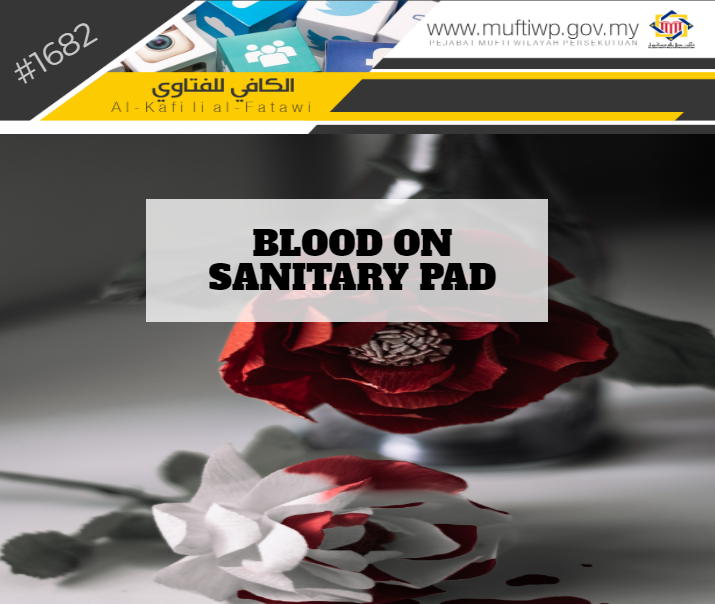Question:
Assalamualaikum wrm.wbt.,
I have a question. There was a time when I was using the same sanitary pad several times before I noticed that there was some blood on it. I’m not sure whether it was my menstruation blood or not. After noticing this, I immediately change my pad. However, what is the status of my prayers throughout this duration?
Answer:
Waalaikumussalam wrm. wbt.,
Alhamdulillah, praise and thanks to Allah for the countless blessings He has blessed us all with. Blessings and salutations to the Prophet Muhammad PBUH, his wives, his family, companions and all those that follow his teachings to the day of judgement.
In our opinion, there are two issues here. First, regarding najis (something that is religiously considered as impure) which is found in a place that is originally pure but then came in contact with najis but is unknown when it actually happened. Another maxim stated:
الْأَصْلُ فِي كُلِّ حَادِثٍ تَقْدِيرُهُ بِأَقْرَبِ زَمَنٍ
Imam Jalaluddin al-Suyuti gave an example, a person performs his ablution using water from a well and perform prayer for several days when he suddenly notices that there is a carcass of a rat inside the well. Then it is not wajib for him to replace his prayers, unless he is certain that he prayed with najis on him.
Refer al-Asybah wa al-Nazhair (pg. 59)
The second issue is if the questioner is certain that she prayed with najis on her, then is it wajib for her to replace the prayers or does it depend on the quantity of the blood? From Ummul Mukminin Aisyah RA, she said:
مَا كَانَ لِإِحْدَانَا إِلَّا ثَوْبٌ وَاحِدٌ تَحِيضُ فِيهِ، فَإِذَا أَصَابَهُ شَيْءٌ مِنْ دَمٍ قَالَتْ بِرِيقِهَا، فَقَصَعَتْهُ بِظُفْرِهَا
“None of us had more than a single garment and we used to have our menses while wearing it. Whenever it got soiled with the blood of menses, we used to apply saliva to the blood spot and rub off the blood with our nails.”
Sahih al-Bukhari (312)
Imam al-Nawawi Rahimahullah in al-Majmu Syarh al-Muhadzzab (1/96) stated:
“Syeikh Abu Hamid and others answered that a small amount of blood does not obligate for it to be removed and her prayer is valid. Thus, this situation is forgiven. It is not warid that Aisyah washes or purify it with saliva. Thus, it is impermissible for you to claim that it can be purified using saliva. What is meant by the hadith is the blood should be removed so that it is no longer visible but the place is still considered to bear najis. Although, it is forgiven because it is a small amount.”
The meaning of small amount is according to the custom (uruf) of a person and it may differ according to each individual’s perspective. To help in understanding this, scholars have listed the ijtihads issued that can be followed in determining whether the blood is a lot or a little according to uruf.
Syeikh Abu Bakar Syato al-Dimyati in I`anah al-Tolibin (1/122):
“What is considered a small or large amount according to the custom is:
- It is said to be a lot when it reaches the stage that it can easily be seen without a person focusing or fixating one’s vision to look for it.
- It is said to be a lot when it is larger than one dinar.
- It is said to be a lot when it is the size of a palm or larger.
- It is said to be a lot when it is larger than the size of the palm.
- It is said to be the size of dirham baghali or the equivalent.
- It is said to be larger than dirham baghali.
- It is said to be larger than a finger.
According to the above facts and explanations, we are inclined to answer as the following:
- If it is uncertain when exactly the blood is excreted on the sanitary pad, then it can be assumed that the blood is excreted after prayer, which is the closest time when it is known that there is blood. Thus, it is unnecessary to qadha’ (replace) the prayer.
- If a person is certain that she prays while bearing najis, she should consider whether the blood is a little or a lot. If it is a small amount, then it is unnecessary for her to qadha’ (replace) her prayers according to the hadith of Aisyah RA. If it a lot, then it is wajib to be replaced. Wallahua’lam.
Hopefully, this explanation will give an understanding to the questioner. We pray that Allah SWT will give us guidance and inayah to become His knowledgeable slaves and people of taqwa. Amin.


